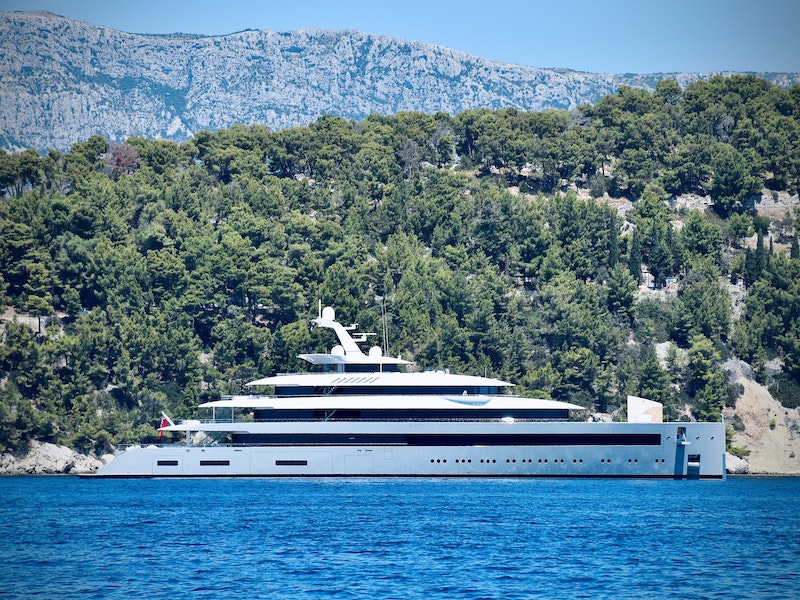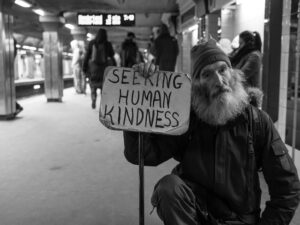Items on a billionaires shopping list might include, the Moonrise superyacht costing $200 million, the Graff Hallucination watch costing $55 million, or maybe an Airbus A380 private jet costing an eye-watering $500 million. A billionaire can buy anything they want, and still have a massive fortune left over. Why do we accept so few having such unbelievable wealth, when so many suffer from poverty? The wealth of billionaires, if directed towards global issues, rather than on vanity projects, could solve many of the world’s problems. So should there be a cap on wealth, making it illegal to be a billionaire?
Well, the superyacht makers may find themselves in trouble, because there would be no market for their products any longer. But before you think the idea of placing a cap on wealth is ridiculous, consider there are 2095 billionaires worldwide. That’s 0.00003% of the global population. In contrast, 700 million people live in extreme poverty. The World Bank defines extreme poverty as earning less than $1.90 per day. So 9% of the human population do not make enough money to provide for their own needs.
While the richest can spunk hundreds of millions on a yacht, the poorest can’t afford to feed themselves.
Between them, billionaires are worth $8 trillion. If ‘billionaires’ were a country, they would be the third richest country on Earth. Richer than the United Kingdom, France and Italy, combined. Three countries with highly developed economies and populations who enjoy high standards of living.
A cap on wealth
At present, we have a situation where 2000 people are hoarding wealth as if it were a collector’s item.
To appreciate how bizarre this behaviour is, imagine you had a gigantic warehouse stacked full of vases. When you show friends and family your impressive hoard they might ask you what are you doing with them? To which you reply, nothing, they sit in the warehouse, collecting dust. They would either think you’re mad, or terrible at business because the potential value of the vases is being lost.
While a warehouse full of vases would seem strange, this is what the world’s billionaires are doing with their money. Money in and of itself isn’t valuable; it’s what you do with the money that is. At present, billionaires hoard cash and watch the value of their wealth increase over time.
That’s why it makes no sense both morally and rationally that we have a billionaire class of people. Because if spent appropriately, this vast sum of money can finance solving the worlds greatest challenges.
Let’s say there is a cap on wealth, set at a symbolic figure of $999 million, still an unfathomably large sum of money. Any money or wealth you attain beyond that point is redirected to a development fund.
That’s not to say it would be illegal to earn beyond this cap, but if you do the wealth gets redistributed to the fund. Because let’s face it, who needs any more than $999 million? By that point, becoming wealthier isn’t going to make your life any better, it merely becomes a case of earning more money, for the sake of doing so.
Human Development Fund
If the worlds 2095 billionaires can still have wealth totalling $999 million it would leave us with a development fund of around $6 trillion. The human development fund would aim to meet human development goals. An excellent framework for such a fund is the United Nations Sustainable Development Goals (SDG’s). The underlying vision of the SDG’s is to “promote prosperity while protecting the planet.”
There are seventeen SDG’s offering a roadmap of what we need to do to “address a range of social needs including education, health, social protection, and job opportunities while tackling climate change and environmental protection”.
The Human Development Fund, funded by the world’s billionaires, would go a long way in helping to meet these goals by the target of 2030.
That bucket of money could finance the end of so many of the world’s problems. Helping to provide the finance needed to invigorate economies and empower people with a platform to fulfil their ambitions.
Again, if you think the idea of a fund to solve social problems is far fetched, consider The National Lottery Community Fund in the UK. The goal of the Community Fund is to “help create stronger, more connected communities.”
While doing fabulous work in poor communities, the Community Fund raises revenue from the National Lottery. Who do you think plays the lottery?
A survey revealed skilled manual workers are the most likely demographic to play the lottery, meaning the lottery ends up being a subversive tax on the poor. The poor are enticed to play the lottery, in the hope they’ll hit the jackpot, while inadvertently helping to finance a fund for poor communities.
A celebration of billionaires
While in theory, a development fund has the potential to transform the world, an issue with the fund is that having so much wealth affords billionaires unbelievable power. It’s unlikely they’ll all voluntarily donate their money to the Development Fund. What’s necessary is for society to wake up to the injustice of massive wealth inequalities and demand that action is taken against this tiny group.
At present, rather then question the gluttony of a minority, media outlets celebrate their wealth.
Forbes goes through great effort to measure the wealth of the richest. The ‘Real-Time Billionaires List’ provides daily updates on how much money the world’s billionaires have either earned or lost on a given day.
Measuring the success of billionaires plays a vital function by helping to justify their wealth and the inequality it inspires. It also encourages each one of us, to want to join their club, creating envy and jealously. We’re fed the belief that being rich beyond your wildest dreams is the epitome of success.
This constant bombardment normalises the billionaire class as if there are lots of billionaires when in reality they are a tiny minority.
The great thing about Forbes rich list is it would make it so easy to identify who we would requisition money from.
A change in behaviour
In a world with a cap on wealth, rather than seeing whether Jeff Bezos has made $400 million today, or Warren Buffet lost $500 million, imagine we placed our focus on the problems. Measurements of success would no longer centre on celebrating how much money the richest people in the world have, but they would focus on progress towards solving global issues.
The metrics we focus on have a powerful influence on us as individuals. While the metrics focus on wealth, everyone is drawn to the rat race. If the metrics focused on global problems, it would awaken people to the injustice of so few having so much. That’s the whole point of why Forbes focuses so meticulously on this fantastic wealth, to distract us all from the real underlying problems. After all, if our eyes are drawn away from the problem, there is no problem.
To appreciate how bizarre our reality has become, I got a breaking news update on my phone recently that Elon musk has overtaken Jeff Bezos as the richest man in the world. The story was felt to be so important, as to justify a breaking news update. The story is irrelevant, who cares whose richer than who? But this is done intentionally to distract us and encourage each person to want what they have, rather than question the fact they can have so much in the first place.
Creating metrics that focus on global problems, which show how the money of the wealthiest is being distributed to solve them, could create a leverage point in inducing changes to human behaviour.
Because metrics are powerful and humans “adjust behaviour based on the metrics they’re held against…what you measure is what you’ll get.”
Rather than focusing on the ruthless rat race, changing our metrics can inspire solidarity. Rather than jealously and envy, focusing on solving world problems, can inspire compassion and empathy.
I’ll spend it how I want
When you break it down, it is barbaric that a tiny minority hoard wealth, while hundreds of millions of people live in terrible poverty. It does not need to be this way. Our current reality is a choice—a choice-driven by greed.
People will say that’s unfair, it’s an injustice, or it’s too complicated. But what’s the greater injustice, taking wealth away from 0.00003% of the population, or the fact people die every day from starvation?
People may say the counter-argument to placing a cap on wealth is two-fold:
- billionaires earned their money so they should spend it how they want, and;
- by having a cap on wealth, you could impact the entrepreneurial spirit and desire to innovate. Considered a vital component of capitalism.
On the latter point, a development fund wouldn’t create an egalitarian dreamworld. You could still aspire to have a net worth of $999 million. Considering only 2095 people have managed to eclipse that figure, it is an amount still high enough to incentivise the entrepreneurial spirit.
On the former, the idea billionaires earned it so they should spend it how they want misses the point. For them to have so much, others must live a life of suffering. For one extreme to exist, another must exist in tandem.
Society has been so brainwashed by the elite justifying the disparity of wealth, that poor people will defend the fact they live such lavish lifestyles. Because those poor people aspire to one day join the club and be a billionaire. The reality is, you won’t because there are only 2095 billionaires in the world.
Rather than being celebrated in society, the billionaire class should be vilified. And we should all demand a cap on wealth which would solve so many of the world’s greatest challenges.
The status quo is a choice. We accept wealth inequality, but if society demanded change, like actual real change, rather then the fallacy of change presented by politicians, we could change the legal framework and make it illegal to be a billionaire. It sounds far fetched, but we need solutions that are outside the box to deal with the worlds greatest challenges. Yes, making it illegal to be a billionaire would radically alter the status quo, and that’s precisely why it could work. Because doing the same things over and over again isn’t working.



